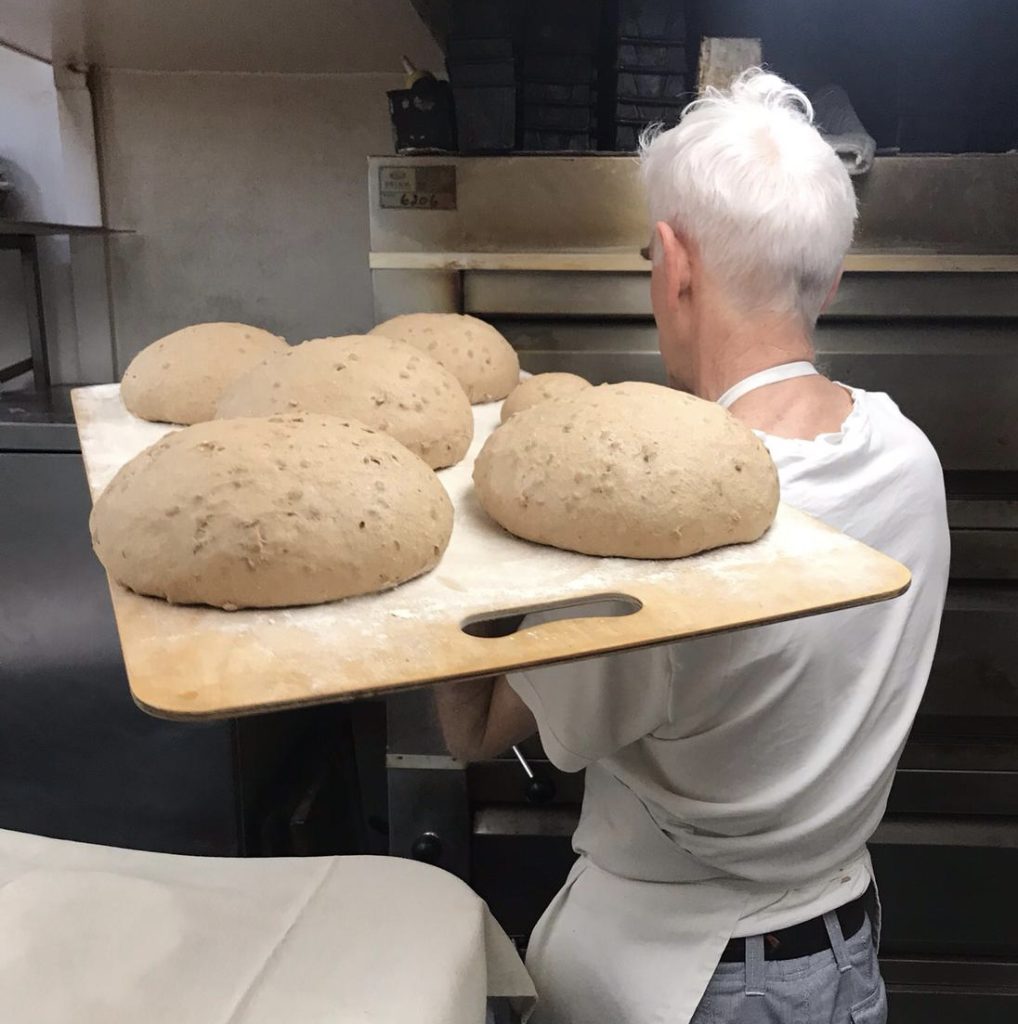
I decided to write a book over ten years ago. A major stimulus was the occurrence – several times – of my students urging me to write a book. They had obviously enjoyed reading the notes I handed out concerning the breads to be made on a particular course they were attending. Perhaps they were surprised I could write clearly and at times entertainingly about those breads being tackled on their courses; whatever the reason there was an earnestness about the encouragement that I should get my knowledge of the craft into a book. I remember thinking lazily at the time that I probably had enough recipes and notes on various breads to have the contents of a normal sized book. It seemed like a good idea, and thus the concept of the book was born.
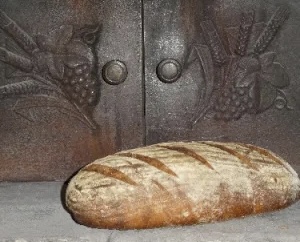
Soon, however, I realised how skimpy my notes and recipes seemed when drawn together into one binding, and to write the sort of book that I admired would become a vast undertaking. One thing was swiftly going to lead to another. How could I write about concepts such as strong flour as opposed to weak or soft flour without providing a treatise on the actual milling of flour? Further, I was aware that I was incapable of stopping myself from delving into history to try to explain the craft and the view of it held collectively by British bakers over the centuries. The same thing occurred when I found myself thinking about man’s relationship to the breadmaking grains: I was not content until I had studied the Neolithic farmer and the emergence of crops, and this too would require a chapter.
To write this blog I have been forced to look within and ask myself about various stimuli and pressures that would have led to the urge to write. It would seem grandiose to say that I did it for posterity. More accurate is to say that I yearn to see that my craft continues. With my book I entrust my readership to nurture the craft, and even pass it on to the next generation. When I began learning to be a bread baker in the mid-1970’s the craft was an endangered species. During the development of our brave new world in the fifties and sixties, the craft was allowed to die. The sons and grandsons did not seem to value what the fathers did. Long working hours and unattractive aspects of the trade such as nightshift seemed old-fashioned, and the sons and grandsons preferred to pursue other jobs and callings. Men in suits told the craftsmen bakers that time was money and there was no time for the long fermentation of bread doughs; their vast and splendid masonry ovens had to go since you could not bake in them when they were being fired, with the chamber full of flames. The craftsmen bakers crumpled, and soon these men were working in bread factories where “instant” dough had been adopted, inspired by the work of the infamous Chorleywood bread research institute.
No time for fermentation means bread without flavour or character. British bread had become that worthless pap, at its lowest level being served up in a supermarket as a “loss leader”, even costing the buying public less than it had cost the plant bakery to make it. The owner of the plant bakeries was commonly the large conglomerate flour milling firms which were content to allow the plant bakery to operate at a loss since their primary goal was the tonnage of flour coming out of the mills. Forty percent of the wrapped and sliced bread sold today will be wasted.
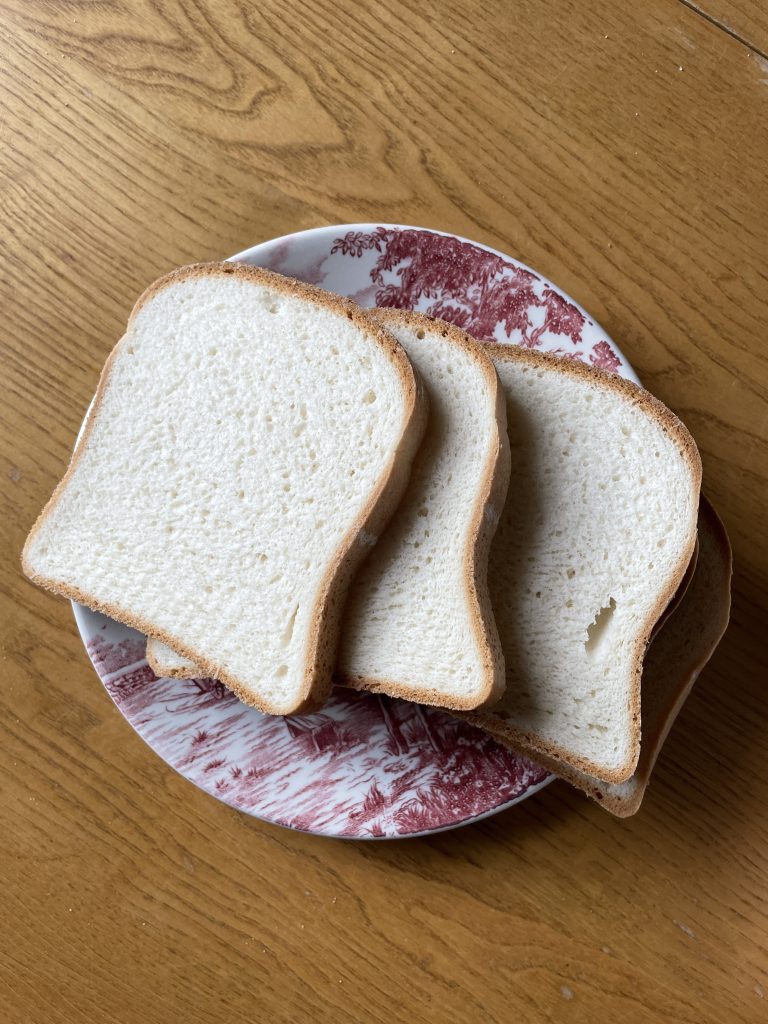
It was in this atmosphere that I began my baking career.
I was not cut out to be a baker. My forbears were from the solid professions. As a teenager I had steadfastly announced I was going to be a lawyer but having completed my degree the young adult persona saw things differently, rebelling against the prospect of a life spent in an office. During some drifting years I had become fascinated by crafts and found myself having strong feelings about the delicate position of traditional crafts in a world becoming uniform and industrialised. Having dropped out from law I spent an informative couple of years in a bohemian arts and crafts colony outside Melbourne, my home city.
After years of university life it intrigued me that in this community I was among people who had a particularly active mental life while working with their hands. There I dabbled in weaving and pottery, but while I knew I was a lover of these splendid crafts, neither of them captivated me. Among the panoply of crafts both weaving and pottery can tend towards the artistic, and I lacked confidence in that sphere, never considering myself artistically creative.
The drifting continued, and I embarked on world travel, so typical of young Australians who set off for Asia and Europe with a rucksack on their back.While the vague destination of the travel was to reach a point of some self-discovery, even self-knowledge, the actual destination was London, where I had an aunt. She listened patiently as I talked of crafts I had yet to try, then announced that in her view a craft that badly needed reviving was baking. She lamented the loss of the baker from every block of suburban shops and told me how charmed she was by a young man who sold a cart-load of fresh rolls inside the gates of one of the great London parks (my guess is that it was probably Kensington Gardens). His rolls were very good, and she mused that it looked like he was making a decent living. She said I could do a lot worse with my talents than becoming a skilled baker. Like any young man I was certainly interested in my stomach, and I recalled that when I had tried to make bread a couple of times with neighbours in the bohemian crafts colony I had found the process of fermentation utterly engaging. Today I wonder why my aunt, herself an abstract painter in oils, suggested baking as the craft for me. Perhaps it was an involuntary reaction to my appetite, which must have appalled her on many occasions when she watched me demolish as “seconds” the chance for her to serve the same meal for her and my uncle the next day.
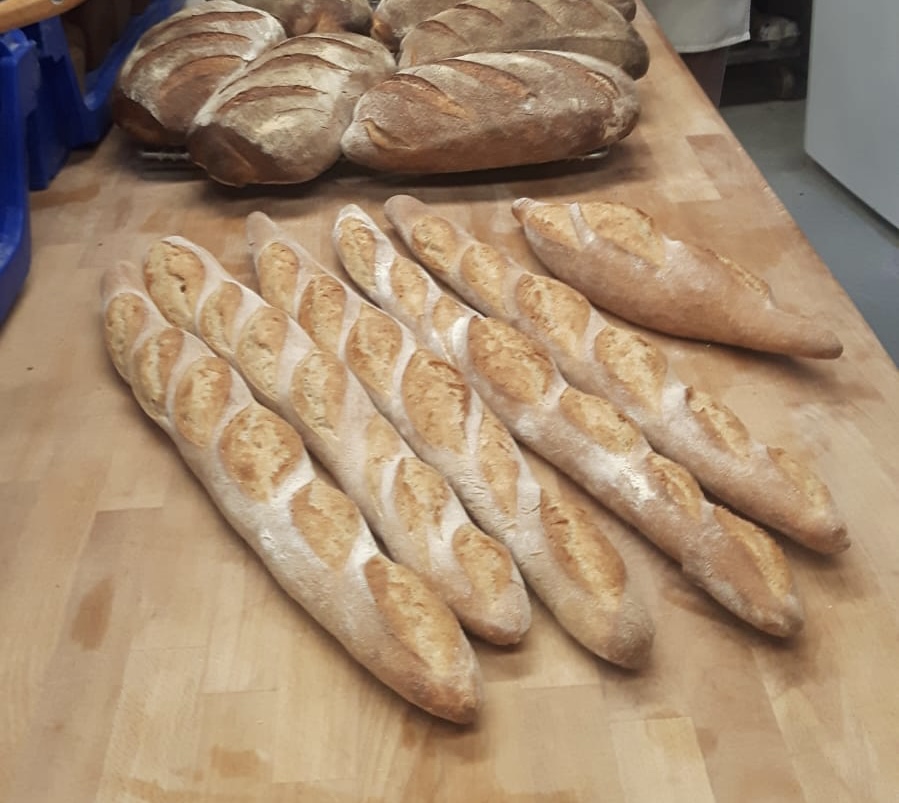
Whatever the reason, she had lit the spark, and the flames never died. Soon I enrolled at the national bakery school at Elephant & Castle, joining the type of course where bakery apprentices went for one day a week. I was fortunate to find a cellar bakery on the Earls Court Road with old brick ovens where the workers persuaded the boss to take me on for the busy Friday night shift. Given my lack of skill they must have been desperate for another pair of hands.
Imagine how grateful I was to my aunt. After years in the wilderness, with baking I found purpose and joy, the soul mates of that deep satisfaction that occurs when you are thrilled to be learning more and more about a chosen field. While stopping short of describing myself as a “crusader”, I felt passion and a sense of purpose about doing my bit to help save the craft of baking. It became urgent to acquire the necessary hand skills and to pick up the folklore from the old school of bakers before it became impossible to meet them. One of those old bakers, sitting on the work bench and drawing on wrapping paper, showed me the principles of constructing a brick oven. By listening to the old boys, the “jobbing” bakers, I had picked up that there is no better baking chamber than a masonry one. Already I had decided that when I build my first bakery it must have a brick oven at its core.
I lasted only two terms at Elephant & Castle. The trouble with the bakery college that dismayed me was the practice encouraged by the lecturers and tutors to add the “improvers” into everything that we made. Superfluous to the raw materials used by the real craftsman, these so-called improvers were a small amount of mysterious powder added at the dough-making phase. Their effect was to make fermentation more rapid by stimulating the yeast as well as both softening and strengthening gluten during different phases of dough proving. When I challenged the tutors about their unnecessary reliance on these chemicals I felt I was being dismissed as an eccentric trouble maker.
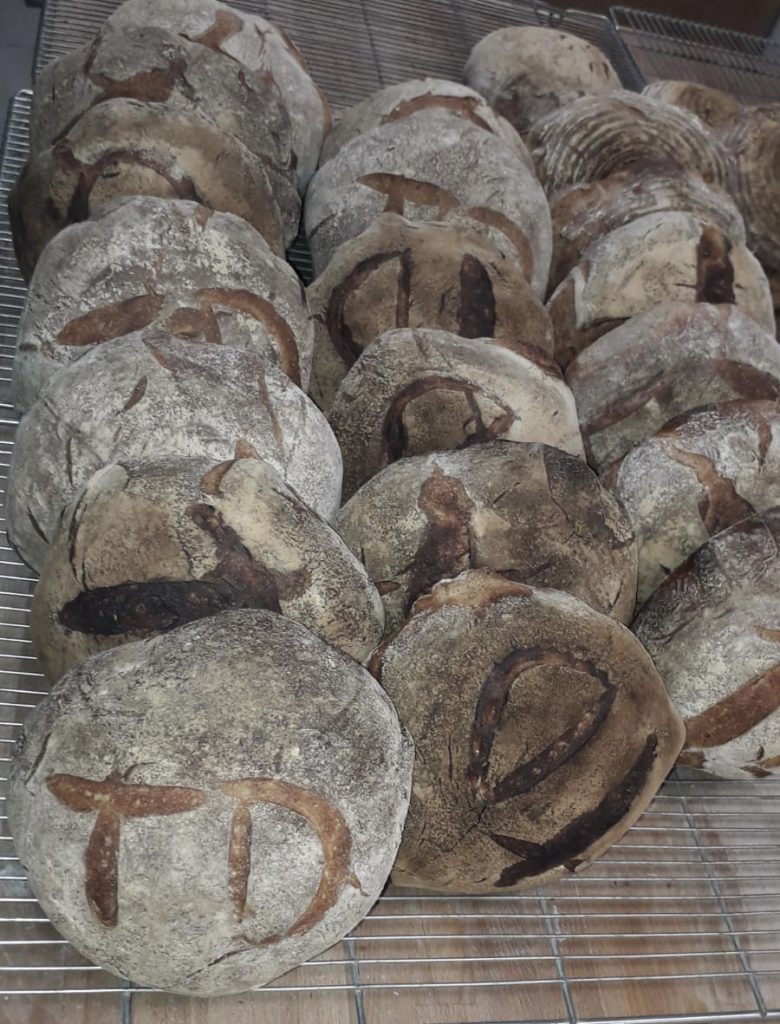
For the next few years, while learning from old craftsmen and seeking employment in craft bakeries, I was basically a self-taught baker and owed a great deal to collecting books about craft baking. There were instructional text books written by British bakers or by scientists whose field was flour and baking. Some of them had become classics for the craft, and there were not many of them since to find an erudite craftsman in the period 1900 – 1940 was a rare thing. The next wave of books were anecdotal ones written by younger bakers who, like me, were part of the craft revival spreading out of the USA and Canada. This revival movement from North America was about 15 years ahead of the revival that occurred in Britain. While finding all these books useful and at times entertaining, at this stage of my life it had not occurred to me to write one. I was far too busy learning.

Fascinating. It’s important to know and understand where really good bread comes from. You write about the process like an artist
Thank you, Jan!
I have admired your collection of short stories, and I do hope I meet you one day. Paul
I can’t wait to read your book! I treasure my time at The Village Bakery, even if you had departed for new adventures by the time I was there. Hard for me to believe it’s been 20 years since I had my epiphany in a field in Melmerby! Your generosity and knowledge in forums and emails helped me a lot in the early day of my professional baking career. Now, maybe I need to schedule a refresher course, and we can meet in person.
Hello Hannah. Thank you for your response – and yes, it would be good to meet since we have a lot of shared experience. I hope your baking is going well. Best wishes, Paul
Can’t wait to read the book!
Hello Eileen, good to get your pithy response. Love your logo. Hope youare thriving there in Canada. Bests, Paul
This is exciting news. A book by Paul Merry. Reading this brought back such memories of being in your classroom at Cann Mills and feeling so inspired to improve my baking competence.
Thanks for your comments, Glenn. You will still have to be patient since the book is a year away. Paul
Julian, how splendid to hear from you! I often think of you and Yosh and your life in Japan (without baking, sadly). Let’s meet again when you visit UK. Regards, Paul
Hello Carl. I remember teaching you and thinking how competent you were! Soon there will be the second instalment of the Blog piece, and I hope I can retain your interest. Bests, Paul